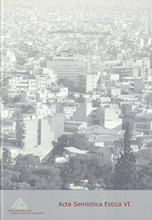Semiootilise hegemooniateooria suunas: Laclau ja Lotman dialoogis
Towards a semiotic theory of hegemony: Lotman and Laclau
Author(s): Andreas Ventsel, Peeter SelgSubject(s): Semiotics / Semiology
Published by: Eesti Semiootika Selts
Keywords: political semiotics; discourse; recoding; Singing Revolution; identity; poliitiline semiootika; diskursuseteooria; ümberkodeerimine; Laulev revolutsioon; identiteet
Summary/Abstract: The paper discusses the relationship between the theory of hegemony as elaborated by Ernesto Laclau and the semiotics of culture of Juri Lotman. The discussion is not limited to a mere expository level, but tries to contribute to the theory of hegemony. We believe that there are several shortcomings — despite many apparent advantages — in Laclau’s model and that some central insights of Lotman could be of service in overcoming them. In our view Laclau represents one of the most far-reaching perspectives in the post-structural tradition of political philosophy that tries to avoid any essentialist theorizing of society and power. Especially fruitful is his notion of “empty signifier” as the central category for defining a hegemonic relation. But the main problem with his theory is that it is basically a social ontology that gives almost no clues for how to formulate research questions for studying power relations in concrete social formations. We believe that the problem is not merely factual, but follows partly from the very logic of his categories. In his latter works he uses the psychoanalytic notion of affect in explaining mechanisms that make it possible for a hegemonic relation to emerge. We believe that this development closes many doors for empirical social research and try to substitute the problem of affect in the theory of hegemony with the problem of translation between different cultural coding systems. And that is where Juri Lotman becomes the central figure. The ground for believing this incorporation of the two thinkers to be successful is the very apparent theoretical congeniality between them. Both belong to the Saussurean ontological terrain. The main functions that Lotman attributes to semiosphere (asymmetry, boundedness, binarism, and heterogeneity among others) bare the same functional roles as do Laclau’s central categories when he specifies his notion of discourse. In our concrete analysis we use the discourse of “the Singing Revolution” as an example of hegemonic discourse.
Journal: Acta Semiotica Estica
- Issue Year: 2009
- Issue No: 6
- Page Range: 120-132
- Page Count: 13
- Language: Estonian

